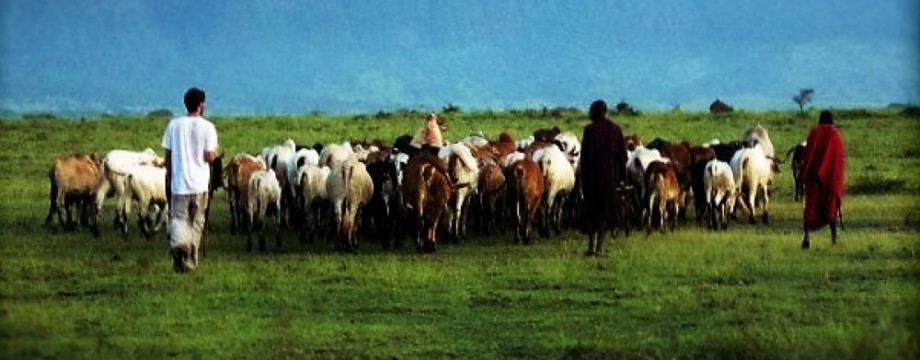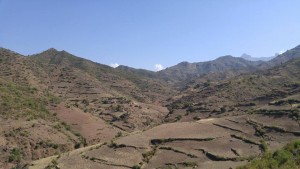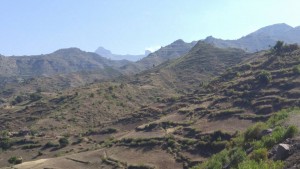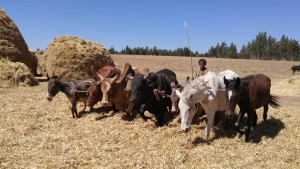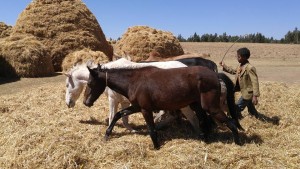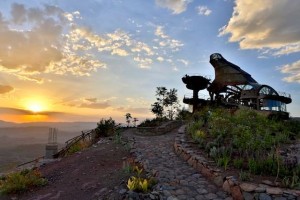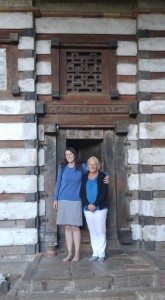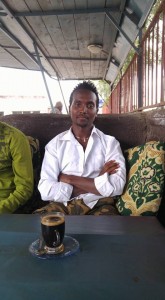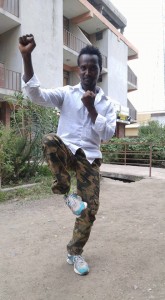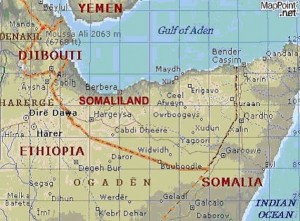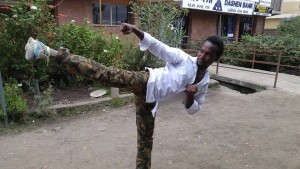Self Imposed Exile
Simen didn’t particularly like trails. What he did like, I discovered, was springing things on me. With the high noon sun threatening to cook us as thoroughly as the treeless, sunbaked landscape all around us, Simen made an impatient dash downhill by the most direct route possible that wouldn’t involve any tumbling. This latest curveball of Simen’s manifested in softball sized rocks rolling past as we dislodged them from the sandy hillside. There was never a dull moment.
Ahead of us, at the base of the mountain, we could see a patchwork quilt of small farms where villagers were hard at work threshing barley in the field. They have a curious habit of using any available animals for this particular job. Because of this the small farms resembled petting zoos put to work. Groups of horses, ponies, mules, donkeys, ox, and horses all worked together in unison to trample mounds of grain by walking a small circle and stomping as they went in order to separate the grain from the seeds. We made our way eagerly towards this scene, trekking through the parched, barren mountainside like we were attempting to walk into a beautiful landscape painting. We continued to delve into conversation as before, but the tempo was a little more muted as hunger and fatigue took root.
By the time we reached the city we were famished. Craving something familiar, I decided to treat Simen to what my guidebook hailed as the best cuisine in town. The restaurant is called Ben Abeba, meaning hill of flowers in a combination of Amharic and the Scottish dialect. It’s set inside an oddly shaped conical structure at the top of a small ridge overlooking the city. Ben Abeba is run by a Scottish woman, and mostly serves western style cuisine. I’m ashamed to admit, but even though I sought to understand the local culture to the best of my ability it wasn’t my first time heading there for a cheeseburger.

The first time I climbed the restaurant’s asymmetrical spires, which are meant to resemble the shape of a mountain but look more like a wizard’s hat, was with the two New Zealanders from my tour group. The Scottish woman in charge came right over to our table, but she hadn’t wanted much to do with me. As an American I couldn’t tell a shepherd’s pie from a dora wat and she knew it. What brought her over were my New Zealand friends whom she honed in on as keenly as a Bajaj spotting faranji pedestrians. The Scottish woman had much more in common with the New Zealanders, starting with the quasi British accents.
To my surprise, as she approached I saw that the owner is an older woman. Her face was reddened by the bright sun beating down on the many levels of her creation, but her eyes were bright and full of life. She chatted with the kiwis with the fervor of a castaway arriving to their homeland. The main topic was how and why she had chosen such an unconventional lifestyle. “Well, it was gettin’ towards retirement time and I knew that my pension was coming my way. All I had to do was figure out what to do with it. I thought to myself, ‘well this is it. I’d better take up watchin’ daytime television. Maybe I could start playin’ bridge or bingo, or else just lay about on the couch.’ I ne’er wanted that kinda life, and I dunno why retirement should be any different. So I come down here to do some volunteer work, and then I get this incredible opportunity. Between retirin’ in Scotland and startin’ this business, it was hardly a choice at all,” she said. At the time I had been impressed, despite the fact that as an American I wasn’t really included in this little reunion of kinship. I reflected on that exchange as Simen and I slogged on and made our way into town. We walked with renewed vigor. The thought of cheeseburgers propelled us as effectively as a carrot dangling from a stick. It wasn’t until I started talking with Simen about the restaurant that I began to question the notions of my first impression.
“I don’t know if that Scottish lady is a good woman,” said Simen. He added, “I have heard many things about how she treats her workers. I think that she is not fair with them. I have even heard this from one of the cooks.” I was taken aback. I couldn’t imagine how someone could go to such great lengths to open a business in a developing country without the welfare of its work force in mind. Then I thought back to another statement she had made, which had stuck with me. The New Zealanders had wanted to know how often Susan, the owner, makes it back to Scotland, and when the last time was. She had responded, “Well, I’ve finally reached the point where I’m comfortable going back and don’t expect things to fall apart the moment I turn around. I asked my crew before I left, ‘so who’s going to yell at you now to keep you all in line once I’ve gone away?’ I said, ‘if it helps keep everyone motivated I can Skype from time to time and yell for a bit, or maybe you can take turns yellin’ at each other until I get back.’ ” At the time I dismissed it as a joke, but looking back there was something about the exchange that irked me. From what I could tell, Ethiopians are generally more soft spoken than what I’m used to, which may reflect a cultural difference. Many times during my trip I would walk down the street and realize that there was a noticeable difference in volume from what I would expect. There was rarely shouting or loud conversation in the streets, and no honking whatsoever despite the hectic traffic conditions. While people tend to be friendly, they were also reserved in that sense. I couldn’t imagine how the locals would react to being yelled at by their boss, and found it equally difficult to imagine a local Ethiopian business owner treating his or her workers the way Susan was. Despite his doubts, Simen couldn’t pass up the rare opportunity to try some of the food in a restaurant that would otherwise be unaffordable.
Once we finally arrived, we got to relax on the top deck of the avant-garde cone building and sipped a popular local drink; avocado smoothie with papaya. It was sublime. We kicked up our feet and watched with amusement as birds skimmed past at eye level, sailing like kites in the wind. I would need the time to recuperate if I was to keep pace with a 17 year old brimming with energy. Simen and I reminisced about the Taekwondo class from the night before over lunch. I thought back to how desperate the club had been for resources. I wanted to do something to make good on my promise to help out in any way I could. I asked Simen if it would be possible to meet with the head instructor that afternoon, so that I could make a small donation while still in the area. He said he’d see what he could do to arrange it.
After we finished our burgers I started wondering what had become of our scones. They weren’t on the menu, but I had learned from observing the New Zealanders that they could be ordered direct from the owner. I had requested them as soon as we walked in, but they still hadn’t arrived. I went down the spiral staircase to speak with the Susan, and she let me know she would track them down for me. As I walked back up to our seats I could see her angrily burst into the kitchen, shouting almost before she knew who she was shouting at. While I had wanted to give her the benefit of the doubt, it seems that Simen may have been right. Escape is a dubious motivation.
Finding Community
After an extraordinarily unusual lunch on the wizard hat, we hailed a Bajaj and set off in the direction of Simen’s part of town. We were off to meet his aunt, as we had discussed earlier in the day. I was pleasantly surprised that I had already met the Bajaj driver that picked us up and knew him by name. What a small town. I asked how he was doing as I hunched over to climb in. I also asked about the driver, Richard’s, cousin with whom I had shared a ride a couple of days before. We were chugging along down the dusty road when Simen received a phone call. He abruptly asked the driver to turn around. It seemed we would be heading in the direction of the Taekwondo master after all. Another last minute change of course by Simen. This made me a little nervous, because even after participating in a full class I had hardly addressed the master directly at all. He hadn’t come across as a very approachable figure.
The venerated Taekwondo instructor was waiting for us at, of course, a cafe. If we couldn’t do an official coffee ceremony then the modern version would have to do. He rose to shake my hand, after which I immediately ordered a macchiato. The historic invasion of Ethiopia by the Italians had lasted only a handful of years, but I was grateful that they had at least left behind the legacy of macchiato to indulge in on just such occasions.
The master, or as they are called in Korean Sah-bum-nin goes by the name of Tesfaw Baye. This explains why I had been referring to him simply as the master. Along with my penchant for eating cheeseburgers I also have a tendency to much more readily grasp familiar names like Simen and Richard. Tesfaw is 25 years old. That was my first surprise. The master is even younger than I am. Based on his calm demeanor, which radiates wisdom and experience, I had assumed him to be my senior. I was impressed. I couldn’t help but take this opportunity not just to make my donation but also to learn as much as I could about his life and find out what makes him tick.
Tesfaw is originally from a region of Ethiopia known as Somaliland. This province is on the border of Somalia and has many cultural and religious ties with that country. It is not among the safest places to live, with intermittent armed border clashes between the two nations being a fairly common occurrence.
Tesfaw graduated from university in Somaliland after 3 years with a B.S. in Applied Biology; however he was unable to find work in that region. He moved to Lalibela seeking better opportunities. When he still was unable to find work in his career field he decided it was time to open up a Taekwondo dojo. He started with about 30 students out of an even smaller and less suitable gym space than what he uses now. His dojo has since grown to somewhere between 70 and 80 students. He has been teaching in Lalibela for the past 5 years.
I did my best to determine what motivated him to go into martial arts in the first place. I asked him more than once, posing the question in several ways when I felt he was glossing over it. I couldn’t weasel many details out of him on that subject. He took up martial arts for the first time in high school starting with a Karate class. One thing he did say is that he had some trouble in high school and needed the discipline and self-defense skills of his training. Maybe he had fallen in with a bad crowd, or was an ‘at risk’ youth in some way. It’s difficult to say for sure due to his vague responses.
One subject that he certainly didn’t shy away from is the impact that Taekwondo has had on himself and his students. While I couldn’t get him to say much about what got him into martial arts in the first place, I couldn’t keep my pen moving fast enough to record his praise for the national and international Taekwondo organizations, and what he has done for his students to bring them into the wider world of the sport’s community.
He boasted proudly not of his own accomplishments, but of his Sah-bum-nin’s. The name of Tesfaw’s own master is Burakat, who is also from Somaliland. Burakat’s grandest achievement is that he was a medalist at an international competition in India. For whatever reason, the first exposure that Ethiopians had to the sport of Taekwondo is from North Korea. Due to politics, many nations including the United States only affiliate with South Korean Taekwondo associations. There is virtually no difference in style between the North and the South. One is called World Taekwondo and the other is International Taekwondo. While the South Korean version is an Olympic sport, the highest level of competition among North Korean practitioners is limited to the international, but not Olympic level. For Tesfaw and his students the distinction has little meaning. It’s thrilling for them to compete on the national level, and the prospect of competition anywhere outside of Ethiopia is exhilarating enough without bringing the Olympics into the picture.
Tesfaw recalls with pride that his gym received silver and gold last year regionally. They also recently won a gold medal on the federal level, and even traveled to Addis Ababa to participate in the Pan Africa Championship. He said that due to his dojo’s association with the larger North Korean organization, one time every year there is the opportunity to meet with masters from Canada, the United Kingdom, and other international locations who come to Addis Ababa to exchange knowledge and techniques.
Tesfaw, who is ordinarily stone faced and tough, becomes animated with enthusiasm as he describes the workings of his network. When I first entered his dojo and formed my impressions of his club, I thought of it as an isolated pocket of talent that must stem from a particularly gifted master who could only have been trained in another location before bringing his knowledge to Lalibela. I pictured it as if his academy was one of the withered trees standing alone on the sun scorched earth in the desert that surrounded us, drawing as much sustenance as it could from a single wellspring. Now I see that his desert outpost shares a network of roots that extends throughout Africa, and even branches out into foreign lands. I don’t know what Tesfaw was searching for when he first began practicing martial arts on the streets of Somaliland, but if it was community, he found it.
I bade farewell to Master Tesfaw and was pleased to see that Richard was still in the parking lot waiting for us, his blue-white Bajaj idling expectantly. Together the 3 of us left the city center and began a slow ascent into what would normally be called the suburbs, just outside of town. As we passed a particularly large, fenced off parcel of land Simen gestured with his hand out the door-frame. “This is the place where master had his first dojo in Lalibela. Want to see?” he asked. Richard got the hint and began slowing down. “Also this is where I went to school. Come, I will show you,” he added. The rickshaw came to a stop on a grassy shoulder and we stepped out onto the side of the road. As we approached the gate I became apprehensive. The last thing I wanted was to be the arrogant faranji that drops in unexpectedly and disrupts the whole school. I imagined that all of the classes would grind to a sudden halt as students swiveled their heads around and stared at me out of every window. Worse yet, I could imagine a mob of them following at my heels during recess. Despite my misgivings the students were much more respectful than I anticipated; I’ll give them credit for that.
As soon as we walked through the gate I insisted on going to the school’s office to get permission to enter. Once I explained our objective, the headmaster was happy to let me roam free. I didn’t get so much as a “helloo!” from the kids like I normally would from just going down the street. These were very studious children. When Simen brought me to the room where Tesfaw had begun teaching I could hardly believe it. Being a martial arts instructor myself, I can appreciate the difficulties of working in such a confined space and the teaching talent necessary to overcome it. Eager to get out of the way before any kind of impending catastrophe between me and a hoard of students could actually come to pass, we saw ourselves out as quickly as we’d entered. “Wow,” I said. “Just wow.”

